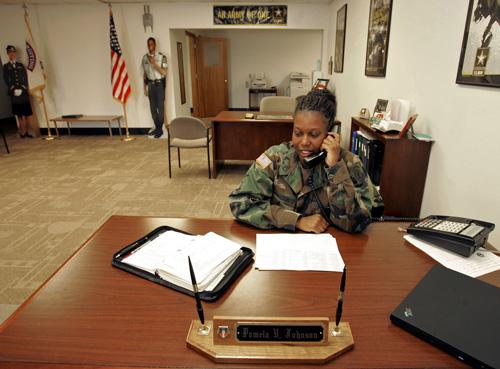Military aiming to ease standards for recruits with criminal records

Sgt. 1st Class Pamela Johnson works the phone at the Army recruiting office in Waterloo, Iowa, in this July 7, 2005 file photo. Erica Magda
Nov 7, 2007
Last updated on May 12, 2016 at 06:23 p.m.
WASHINGTON – Faced with higher recruiting goals, the Pentagon is quietly looking for ways to make it easier for people with minor criminal records to join the military, The Associated Press has learned.
The review, in its early stages, comes as the number of Army recruits needing waivers for bad behavior – such as trying drugs, stealing, carrying weapons on school grounds and fighting – rose from 15 percent in 2006 to 18 percent this year. And it reflects the services’ growing use of criminal, health and other waivers to build their ranks.
Overall, about three in every 10 recruits must get a waiver, according to Pentagon statistics obtained by AP, and about two-thirds of those approved in recent years have been for criminal behavior. Some recruits must get more than one waiver to cover things ranging from any criminal record, to health problems such as asthma or flat feet, to low aptitude scores – and even for some tattoos.
The goal of the review is to make cumbersome waiver requirements consistent across the services – the Army, Marine Corps, Navy and Air Force – and reduce the number of petty crimes that now trigger the process. Still, some Army officers worry that disciplinary problems will grow as more soldiers with records, past drug use and behavior problems are brought in.
Get The Daily Illini in your inbox!
Lt. Gen. Michael Rochelle, the Army’s deputy chief of staff for personnel, said the review is necessary. Now, he said, many recruits who were arrested as juveniles for what can be considered youthful indiscretions – minor fights or theft – are forced to get waivers even if they were never convicted of the crime.
“I do believe it needs to be done,” Rochelle said of the waiver review. “There are really anomalies out there.”
The waivers require more time, paperwork and investigation, from detailed health screenings and doctor referrals to testimonials about past bad behavior. Depending on the seriousness, the final decision can be made by senior recruiting officers or higher-ranking commanders.
In addition, many waiver requirements differ from service to service, and some officials and recruiters say the policies should be more uniform.
The starkest difference involves Marines and drug use. The Marines require a waiver for one-time marijuana use, while the other services don’t, and 69 percent of conduct waivers for Marines who joined from October 2006 to June 2007 were for previous drug use. It was 12 percent for the Army.
The bulk of the Army’s conduct waivers during that time – 71 percent – were for serious misdemeanors, which can include thefts worth more than $500, any incident involving a dangerous weapon on school grounds, or minor assaults and fights. A waiver is required even if the recruit was a juvenile and the charge was dismissed after restitution, community service or other conditions were met.
According to the Pentagon data, the bulk of all conduct waivers are for recruits involved in either drug offenses or serious misdemeanors. Over the past five years, the overall percentage of recruits involved in serious misdemeanors has grown.
A bit more than 75 percent of the Marine waivers from October 1996 through June 2007 were for conduct, compared with about 73 percent the previous two years. In both years, the bulk of the remaining waivers were for medical issues.
Similarly, about 77 percent of the waivers for Air Force recruits in 2003 were for conduct, compared with 80.8 percent through June 2007. The Navy was the only service that saw a decline, with 56.7 of waivers in 2003 for conduct, compared with 40.3 percent through June 2007.
Relaxing some of the waiver requirements may make it easier for the Army to meet increased pressure for recruits in the next few years.
The Army is already strained by the wars in Iraq and Afghanistan and needs to grow to meet those demands and be prepared to respond to crises in any other hot spot.
The Pentagon has recommended the Army be increased by about 65,000 soldiers to a total of 547,000, and the Marines be increased by 27,000 to 202,000. The services will either have to bring in more new people or convince more current soldiers and Marines to stay on.
Army recruiters attending a recent conference in Denver said they often encounter would-be soldiers whose records are tainted by minor offenses.





